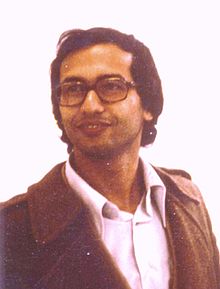Tahar Djaout
Tahar Djaout | |
|---|---|
 Djaout in 1980 | |
| Born | 11 January 1954 Oulkhou, Algeria |
| Died | 2 June 1993 (aged 39) Algiers, Algeria |
| Occupation | Journalist, poet |
| Language | French language |
| Nationality | Algerian |
| Signature | |
Tahar Djaout (11 January 1954 – 2 June 1993) was an Algerian journalist, poet, and fiction writer. He was assassinated in 1993 by the Armed Islamic Group.
Early life[edit]
He was born in 1954 in Oulkhou, a village in the Kabylie region. After university he worked as a journalist for Algérie Actualité, and by the late 1980s, he became one of Algeria's foremost literary talents.[1]
Assassination[edit]
He was assassinated by the Armed Islamic Group because of his support of secularism and opposition to what he considered fanaticism. He was attacked on 26 May 1993 as he was leaving his home in Algiers, Algeria. He died on 2 June, after lying in a coma for a week. One of his attackers professed that he was murdered because he "wielded a fearsome pen that could have an effect on Islamic sectors."[2]
After his death the BBC made a documentary about him entitled 'Shooting the Writer', introduced by Salman Rushdie.[3]
Work[edit]
- The Last Summer of Reason Novel, Ruminator Books, 2001] (French edn: Le dernier été de la raison, Paris, Seuil, 1999]
- The Watchers [Novel, Ruminator Books] (French edn: Les Vigiles, Editions du Seuil, 1991)
- L'invention du Desert, [Novel, Editions du Seuil, 1987]
- Les Chercheurs d'Os [Novel, Editions du Seuil, 1984]
- Les Rets de l'oiseleur (short stories) [SNED, Algiers, 1983]
- L'oiseau minéral, poems, [Sigean, L'Orycte, 1982]
- L'exproprié, [Novel, SNED, Algiers, 1981]
- Insulaire et Cie, poems [Sigean, L'Orycte, 1980]
- L'Arche à vau-l'eau, poems [Editions Saint-Germain-des-Prés, Paris, 1978]
- Solstice Barbelé, poems, [Editions Naaman, Québec, 1975]
See also[edit]
External links[edit]
- Tahar Djaout [1]
- Silence is Death: The Life and Work of Tahar Djaout [2] by Julija Sukys [3]
- "Islamists Killed Tahar Djaout: We Should Give Life to His Ideas," by Jennifer Bryson, January 16, 2009, [4]
- Ali Chibani, Tahar Djaout et Lounis Aït Menguellet. Temps clos et ruptures spatiales, Paris, L'Harmattan, 2012. [5]
References[edit]
- ^ James McDougall (24 April 2017). A History of Algeria. Cambridge University Press. p. 290. ISBN 978-0-521-85164-0.
- ^ Tolan, Fiona; Morton, Stephen; Valassopoulos, Anastasia; et al., eds. (September 13, 2013). Literature, Migration and the 'War on Terror. Routledge. p. 176. ISBN 978-0415845687.
- ^ "Looking back at Salman Rushdie's The Satanic Verses | Salman Rushdie | The Guardian". amp.theguardian.com. Retrieved 2022-05-26.
